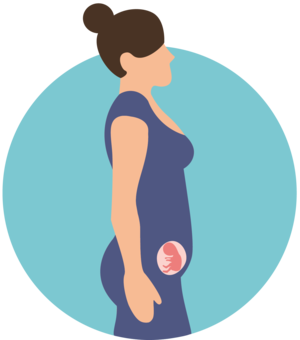Pregnancy at week 16
4-minute read
Your baby
Your baby now weighs about 110g and is about 12.5cm – around the size of a small avocado. They are growing quickly and are about to have a growth spurt. They will roughly double in size over the next month.
The baby looks much more human now. Their eyes are no longer at the side of their head and their ears are in the right place. All of their joints are working and they can wriggle their fingers and toes.
The umbilical cord is now fully formed, with 2 arteries and 1 vein. Your baby may be gripping hold of it. They can flex their muscles and limbs and make expressions with their face, although they can’t control them yet.
Your baby at 16 weeks
| Length: | 12.5cm |
| Weight: | 110g |

Your body
Many women have a clear 'baby bump' by now. Some will even feel their baby moving for the first time, especially if this isn’t their first pregnancy. But don’t worry if you can’t feel anything yet – many women won’t notice their baby’s movements until 18 to 22 weeks into their pregnancy.
Increases in your blood and hormone levels might be causing you some discomfort. You might develop acne as your skin produces more oil. You might also notice varicose veins or get cramps in your legs. Exercising and stretching should help to relieve this.
As you and your baby put on weight, it’s important to take care of your back since back ache is common. Make sure you stand straight and bend and lift correctly. Doing simple stretches and exercises can also help with back ache.
Things to remember
Some women notice their libido increases during the second trimester. This is because of the hormones. Other women find they don’t want sex at all during this time.
It’s fine to have sex while you’re pregnant, unless your doctor or midwife has told you not to. It won’t harm your baby. If you or your partner don’t feel like sex, you can still be intimate by touching or massage. Every couple is different.
Your doctor may offer you further screening or diagnostic tests at this time, including a blood test and ultrasound (maternal serum screening) or amniocentesis.
Read next

Your pregnancy at 17 weeks
Learn about your pregnancy journey and what is happening to you and your baby.

Speak to a maternal child health nurse
Call Pregnancy, Birth and Baby to speak to a maternal child health nurse on 1800 882 436 or video call. Available 7am to midnight (AET), 7 days a week.
Learn more here about the development and quality assurance of healthdirect content.
Last reviewed: August 2020




